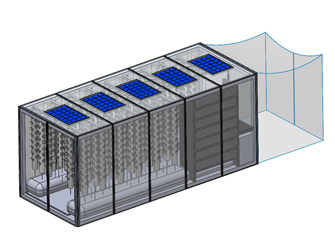In 2021, he and his partner Ben Sych (also MSES ‘21) received $5,000 in funding for Agroco through the Resnick Family Social Impact Program—a grant that supports student projects that advance local and global solutions in sustainability and energy. The Program is administered by ISEN.
Hernández had been tinkering with the idea behind Agroco for two years, but finally came up with the modular solution midway through his MSES program. He says that getting the award provided validity to the project. “Getting that recognition from Resnick definitely accelerated us,” Hernández says. “It only made us bolder: ‘We definitely have something that somebody else has recognized. Let's see how we can further improve it.’” With the funding, the team hired two students and accelerated their product design, development and business strategy. “That vision is becoming more visible and more clear each day,” Hernández says.
Agroco’s mission of increasing food production across the globe is especially important today. Around 880 million people worldwide had insufficient food consumption in early May 2022, according to the United Nations World Food Programme Hunger Map. Additionally, about 25% of total land area across the globe is degraded, according to the International Institute for Sustainable Development. “We can’t rely on the same food system, because we know the same system is already not providing enough for everyone,” Hernández says.
In vertical farms, crops are grown in stacked layers. Growers can install these tiers in climate-controlled spaces such as large warehouses, shipping containers or even regular buildings. Agroco’s modular farming solution is unique—it uses systems that can be placed in both rural and urban settings, even on parking lots. They look like greenhouses, with a solar panel on the top, and are connected to the internet. And, the modules are self-sustaining, not dependent on the power grid and instead powered by renewable sources with battery storage, so they can be installed even in remote locations.
Today, Hernández is already looking 10 to 20 years ahead. He hopes to expand to more than 15 countries. “In 10 years, I envision us to be one of the companies that people come to for solutions,” Hernández says. “As food problems only worsen due to climate change and everything that's going on around that, I want us to be in a position that we're ready for it—we have the system; we have the expertise; we know where to go; we’re talking to the right people.”
